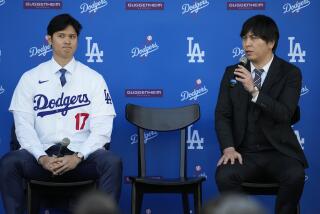Old Pros Shuffle Deck but Delay the Deal : Diplomacy: Baker and Miyazawa renew their acquaintance and discuss issues in Tokyo.
- Share via
TOKYO — It was like two friendly old poker players coming together for yet another high-stakes game, each one familiar with the other, each smiling but eager to find out how the other will play his cards this time.
Secretary of State James A. Baker III and Japan’s new prime minister, Kiichi Miyazawa, two of the world’s canniest and most experienced political operators, sat down together Monday to begin the delicate task of figuring out how the United States and Japan will deal with each other over the next few years.
Baker was the first top U.S. official to meet with Miyazawa since he was elected prime minister Oct. 27. President Bush was planning to see the prime minister here at the end of this month but last week postponed a swing through Asia. Japanese officials said Miyazawa told Baker on Monday that he hopes the President will come to Japan as soon as possible.
According to both U.S. and Japanese officials, Miyazawa and Baker talked about a host of issues--including China, North Korea and America’s continuing trade deficit with Japan. But they made no far-reaching decisions Monday.
“This is not the sort of session where we expect to come in and be closing deals. This isn’t sort of a negotiating session,” said one senior State Department official.
Instead, the two men seem to have spent the time sizing each other up, as they have done before in other jobs and on other occasions. Both Baker and Miyazawa are known as deal-makers, and there will be some tough deals to negotiate soon.
The Japanese prime minister will have to decide, for example, how far to go in accommodating American demands that Japan open up its market to allow imported rice. The United States will want Japanese help, particularly economic aid, to buttress American foreign policy in places ranging from the Middle East to Cambodia.
Baker and Miyazawa already know each other well. Miyazawa served as Japan’s finance minister from 1986 to 1988, during a period when Baker was treasury secretary.
That was the era when the United States, with Baker a leading player, was trying to reduce its trade deficit with Japan by devaluing the dollar against the Japanese yen. And Japan, with Miyazawa playing a key role, was trying to minimize the impact upon the Japanese economy.
After Miyazawa was forced to resign in 1988 for his involvement in Japan’s Recruit Co. stock scandal, Baker--a man who knows that virtually nothing lasts forever for those in political life--continued to stay in touch.
The secretary of state took care to meet with Miyazawa during a 1989 trip to Tokyo, and he greeted the Japanese leader when he visited Washington while out of office. “These are two people who know each other very well,” said one U.S. official Monday. “They don’t have to get to know each other.”
Some American experts have been predicting that Miyazawa, who has been directly involved in negotiations with the United States over the past three decades, will turn out to be much more difficult for the Bush Administration than was Toshiki Kaifu, his predecessor as prime minister.
“The next year could be interesting,” said one U.S. analyst recently. “The Bush people are not used to dealing with a strong Japanese prime minister.”
But there was no outward sign of disagreement when Baker met Miyazawa on Monday. Instead, each man gave seemingly good-natured recognition to the other’s domestic political problems.
At the outset, Miyazawa bantered with Baker in English. But when the formal talks began, the Japanese prime minister, who speaks fluent English, announced that he would switch to Japanese and talk through a translator. Baker laughed, Japanese officials said. In Japan, Miyazawa’s willingness and ability to speak English has sometimes been depicted as a political liability.
Aides said the two men found much they could agree on. The United States and Japan are working closely together, for example, in trying to prevent North Korea from developing nuclear weapons.
Baker also told Miyazawa that Japan should continue to work with the United States in trying to persuade China to stop exporting missiles and nuclear technology to Third World countries. According to Japanese officials, Miyazawa told Baker that Japan has already raised questions of arms proliferation and human rights in its dealings with the Chinese regime.
In the wake of Bush’s sudden postponement of his visit to Japan, U.S. officials said Monday that the Japanese prime minister has been invited to visit the United States. But it appears that Miyazawa, a patient and persistent negotiator, will eventually get the visit to Tokyo he wants from Bush.
“The expectation is that the President will be coming before long,” a senior State Department official acknowledged after Baker’s meeting with Miyazawa.
Times staff writer Leslie Helm contributed to this report.
More to Read
Sign up for Essential California
The most important California stories and recommendations in your inbox every morning.
You may occasionally receive promotional content from the Los Angeles Times.












